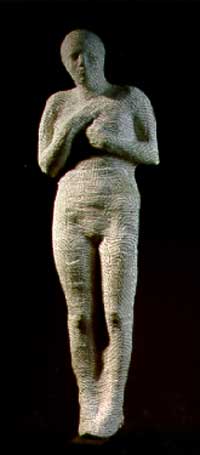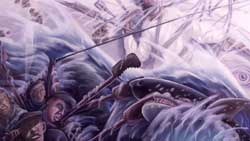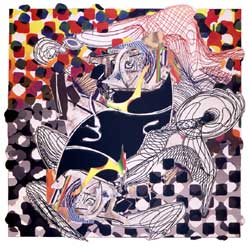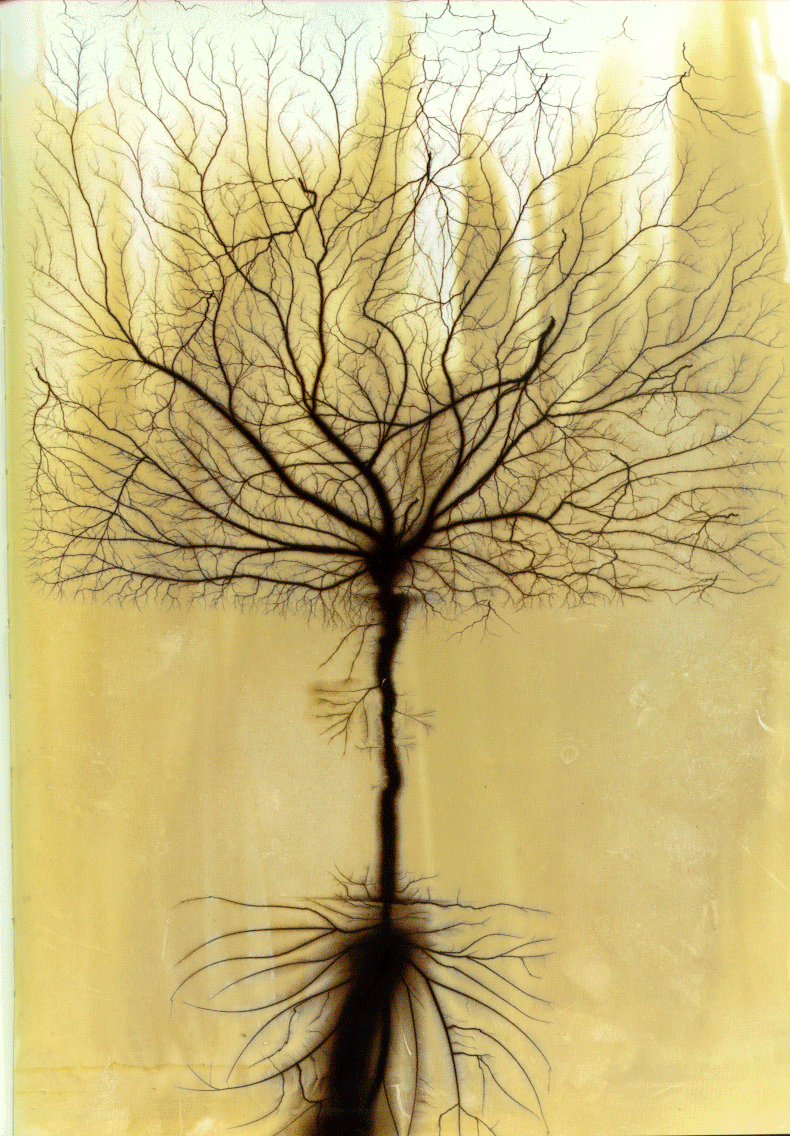3/30/04:
Moby-Dick --
Three Hundred Pages Into the Quest;
or, Risking a Few Meanings
"There's another rendering now; but still one text." (Ch. 99, p. 335)
Simran: I think the straightforward text- the opposite of the inaccesible text-
would actually result in a limitation of the gamut of possible meanings.

Images on this page are taken from
Not All Paintings of Moby-Dick Look Mighty Like a Whale (University of Michigan)
Images Taken from Artists After Moby-Dick (Hofstra Museum, 2001)
Paul: What about Anne's claim that the book is a self-reflexive joke, an assertion that literature lacks meaning?
The first thing to say: that's only 1/2 the story. What I actually traced was BOTH the
Inadequacy of books...
Attempts at definition, simultaneous joke at difficulty...
questions usefulness of activity of scholarship...?
And yet: there is SUCH a strong, insistent meaning-making impulse throughout the novel
"Elemental human passions/anxieties re: ground of our being:
how world is framed/governed
Insistence on extrapolating cosmological implications from local experience
Every story particularly pressed to yield a model of the world...."
(these observations are from D.H. Lawrence's "Herman Melville's Moby-Dick." Studies In Classic American Literature [1923]: 153-170,
which also argues that Moby-Dick is our "deepest blood-nature hunted by the maniacal fanaticism of mental consciousness...." )
Becky: i find it difficult to imagine going about life or writing such a big book or in any way seriously investing themselves in something they think is ONLY ultimately laughable.... i think of moby dick more a an often playful, through an admittedly futile, search for meaning, a search that melville is nonetheless earnestly engaged in.
So, without for a moment losing a sense of the insistent "Jokey-ness" of It All,
without forgetting that "what in all things makes the sounding-board is this--there's naught beneath" (Ch. 127, p. 395)
(or more postively, from one of Em's poems, with "...the violin a wooden room beneath my chin....")

I want today to follow Ro on Hawthorne on Melville: "He can neither believe, nor be comfortable in his unbelief, and he is too honest and courageous not to try to do one or the other."
And Kat on
Paul, Like Orah and, apparently, Melville, "[did] not seem to rest" any in is conclusion- probably because, like he confess, he does not "believe" in any of it, but is "too honest and courageous not to try "....
I want to trace a few possible meanings the novel "makes"
within the very specific context of this course.
I want to look @ what Melville may be telling us about - The Nature of Perception
- The Nature of the Self
- The Nature of the World
--
and then end with some reading questions to guide you through the remaining 100 pp. of the novel
(following Hobbes, following Dennett) about--- The (Possibly Preferable?) Nature of Society.
I. The Nature of Perception

Frank Stella, The Funeral from Moby-Dick (Domes) 1992
Now, from this peculiar sideway position of the whale's eyes, it is plain that he can never see an object which is exactly ahead, no more than he can one exactly astern. In a word, the position of the whale's eyes corresponds to that of a man's ears; and you may fancy, for yourself, how it would fare with you, did you sideways survey objects through your ears. You would find that you could only command some thirty degrees of vision in advance of the straight side-line of sight; and about thirty more behind it. If your bitterest foe were walking straight towards you, with dagger uplifted in broad day, you would not be able to see him, any more than if he were stealing upon you from behind. In a word, you would have two backs, so to speak; but, at the same time, also, two fronts (side fronts): for what is it that makes the front of a man - what, indeed, but his eyes?
Moreover, while in most other animals that I can now think of, the eyes are so planted as imperceptibly to blend their visual power, so as to produce one picture and not two to the brain; the peculiar position of the whale's eyes, effectually divided as they are by many cubic feet of solid head, which towers between them like a great mountain separating two lakes in valleys; this, of course, must wholly separate the impressions which each independent organ imparts. The whale, therefore, must see one distinct picture on this side, and another distinct picture on that side; while all between must be profound darkness and nothingness to him. Man may, in effect, be said to look out on the world from a sentry-box with two joined sashes for his window. But with the whale, these two sashes are separately inserted, making two distinct windows, but sadly impairing the view.
...so long as a man's eyes are open in the light, the act of seeing is involuntary; that is, he cannot then help mechanically seeing whatever objects are before him. Nevertheless, any one's experience will teach him, that though he can take in an undiscriminating sweep of things at one glance, it is quite impossible for him, attentively, and completely, to examine any two things - however large or however small - at one and the same instant of time; never mind if they lie side by side and touch each other. But if you now come to separate these two objects, and surround each by a circle of profound darkness; then, in order to see one of them, in such a manner as to bring your mind to bear on it, the other will be utterly excluded from your contemporary consciousness. How is it, then, with the whale? True, both his eyes, in themselves, must simultaneously act; but is his brain so much more comprehensive, combining, and subtle than man's, that he can at the same moment of time attentively examine two distinct prospects, one on one side of him, and the other in an exactly opposite direction? If he can, then is it as marvellous a thing in him, as if a man were able simultaneously to go through the demonstrations of two distinct problems in Euclid. ... (Ch. 74, pp. 262-263)
Cf. F. Scott Fitzgerald (via Su-Lyn): "The test of a first-rate intelligence is the ability to hold two conflicting ideas in mind at the same time, and still retain the ability to function."
Cf. Orah: i guess what i am protesting agianst is the binary nature of the world we have created.
We don't know whether Melville knew that oysters don't have eyes...
We don't know what Melville knew about (probably he knew nothing about?) blindspots,
and the way our brain "fills them in."
But we can say (from this passage) that...
I. This novel is about filling in the blindspot:
making meaning where there is NONE.
(The whale will ram the ship. But maybe the whale can't SEE the ship?!)
AND
II. The self and the world the self perceives, as Melville constructs them in this novel,
are both insistently bi-partite.
He figures the self, like the whale's eyesight, as doubled,
not in control of, and unable to reconcile, its own motivations and impulses.
It has a shadow it does not know.
II. The Nature of the Self: A Shadow That Does Not Know Itself

Abby Schlacter, Queequeg in her Coffin II (1997)
Aia: curious passages throughout the book...alludes to Ahab and Fedallah being one man - Fedallah an externalized insecurity perhaps? Fedallah, shadow, stare, wordless communication...
And Ahab chanced so to stand, that the Parsee occupied his shadow; while, if the Parsee's shadow was there at all it seemed only to blend with, and lengthen Ahab's. (Ch. 73, p. 261)
...did you deeply scan him in his more secret confidential hours; when he thought no glance but one was on him; then you would have seen that even as Ahab's eyes so awed the crew's, the inscrutable Parsee's glance awed his; or somehow, at least, in some wild way, at times affected it. Such an added, gliding strangeness began to invest the thin Fedallah now; such ceaseless shudderings shook him; that the men looked dubious at him; half uncertain, as it seemed, whether indeed he were a mortal substance, or else a tremulous shadow cast upon the deck by some unseen being's body. And that shadow was always hovering there. (Ch. 130, p. 401)

"And if I still feel the smart of my crushed leg, though it be now so long dissolved....How dost thou know that some entire, living, thinking thing may not be invisibly and uninterpenetratingly standing precisely where thou now standest; aye, and standing there in thy spite? In thy most solitary hours, then, dost thou not fear eavesdroppers? " (Ch. 108, p. 360)
"What is it, what nameless, inscrutable, unearthly thing is it; what cozzening, hidden lord and master, and cruel, remorseless emperor commands me; that against all natural lovings and longings, I so keep pushing, and crowding, and jamming myself on all the time; recklessly making me ready to do what in my own proper, natural heart, I durst not so much as dare? Is Ahab, Ahab? Is it I, God, or who, that lifts this arm? But if the great sun move not of himself; but is as an errand-boy in heaven; nor one single star can revolve, but by some invisible power; how then can this one small heart beat; this one small brain think thoughts; unless God does that beating, does that thinking, does that living, and not I." (Ch. 132, p. 406)
...his own proper person was a riddle to unfold; a wondrous work in one volume; but whose mysteries not even himself could read, though his own live heart beat against them; and these mysteries were therefore destined in the end to moulder away with the living parchment whereon they were inscribed, and so be unsolved to the last. (Ch. 110, p. 366-367)
There is no steady unretracing progress in this life; we do not advance through fixed gradations, and at the last one pause: - through infancy's unconscious spell, boyhood's thoughtless faith, adolescence' doubt (the common doom), then scepticism, then disbelief, resting at last in manhood's pondering repose of If. But once gone through, we trace the round again; and are infants, boys, and men, and Ifs eternally. Where lies the final harbor, whence we unmoor no more? in what rapt ether sails the world, of which the weariest will never weary? Where is the foundling's father hidden? Our souls are like those orphans whose unwedded mothers die in bearing them: the secret of our paternity lies in their grave, and we must there to learn it. (Ch. 114, p. 373)
Here's food for thought, had Ahab time to think; but Ahab never thinks; he only feels, feels, feels; that's tingling enough for mortal man! to think's audacity. God only has that right and privilege. Thinking is, or ought to be, a coolness and a calmness; and our poor hearts throb, and our poor brains beat too much for that. And yet, I've sometimes thought my brain was very calm - frozen calm, this old skull cracks so, like a glass in which the contents turned to ice, and shiver it. And still this hair is growing now.... (Ch. 135, p. 419)
III. The Nature of the World (A Projection of the Self?)

Perrin: So perhaps there is no real antagonist in this novel...except for ourselves?
It does seem to me, that herein we see the rare virtue of a strong individual vitality, and the rare virtue of thick walls, and the rare virtue of interior spaciousness. Oh, man! admire and model thyself after the whale! Do thou, too, remain warm among ice. Do thou, too, live in this world without being of it. Be cool at the equator; keep thy blood fluid at the Pole. Like the great dome of St. Peter's, and like the great whale, retain, O man! in all seasons a temperature of thine own. (Ch. 68, p. 247)
...consider them both, the sea and the land; and do you not find a strange analogy to something in yourself? For as this appalling ocean surrounds the verdant land, so in the soul of man there lies one insular Tahiti, full of peace and joy, but encompassed by all the horrors of the half known life. (Ch. 58, p. 225)
O Nature, and O soul of man! how far beyond all utterance are your linked analogies! not the smallest atom stirs or lives on matter, but has its cunning duplicate in mind. Ch. 70, p. 250)
...this round gold is but the image of the rounder globe, which, like a magician's glass, to each and every man in turn but mirrors back his own mysterious self.(Ch. 99, p. 332)
...not so much predictions from without, as verifications of the foregoing things within. For with little external to constrain us, the innermost necessities in our being, these still drive us on. (Ch. 36, p. 141)
... for days and days we voyaged along, through seas so wearily, lonesomely mild, that all space, in repugnance to our vengeful errand, seemed vacating itself of life before our urn-like prow.... And heaved and heaved, still unrestingly heaved the black sea, as if its vast tides were a conscience; and the great mundane soul were in anguish and remorse for the long sin and suffering it had bred. (Ch. 51, p. 193)
SO: if we all have blindspots
(and cannot but fill them in with what we know);
AND IF the self is divided, and knows not itself;
AND IF what we know of the world is but a projection of the self's deepest impulses...
Then how should society be shaped?
Can (the idea of) evolution help us here?
IV. The Nature of Society: What Is It? What should it Be?

Mark Miloff, The Chase--Third Day (1985)
"By art is created that great Leviathan, called a Commnwealth or State--(in Latin, civitas) which is but an artificial man." Opening sentence of Hobbes's Leviathan ("Extracts," Moby-Dick)
Reading Notes from Dennett, Chapter 16, "On the Origin of Morality":
453: Thomas Hobbes first sociobiologist (ask Jen her views of this!)
454: mutation from state of nature to social contract (=eukaryotic revolution)
457: in what regards is society like a giant organism?
learn abt. social problems of defecting (promising/reneging) and tragedy of the commons
455: John Rawls (etc.): morality as emergent product of major innovation in perspective:
debate until achieve reflective equilibrium: (=evolutionary stable strategy)
key innovation is "veil of ignorance":
vote w/out knowing your particular niche in social design (so consider likely effects for all)

Frank Stella, The Whale-Watch (1993)
Further Passages (re: social life) from Moby-Dick:
Seat thyself sultanically among the moons of Saturn, and take high abstracted man alone; and he seems a wonder, a grandeur, and a woe. But from the same point, take mankind in mass, and for the most part, they seem a mob of unnecessary duplicates, both contemporary and hereditary. (Ch. 107, p. 356)
They were one man, not thirty. For as the one ship that held them all; though it was put together of all contrasting things - oak, and maple, and pine wood; iron, and pitch, and hemp - yet all these ran into each other in the one concrete hull, which shot on its way, both balanced and directed by the long central keel; even so, all the individualities of the crew, this man's valor, that man's fear; guilt and guiltiness, all varieties were welded into oneness, and were all directed to that fatal goal which Ahab their one lord and keel did point to. (Ch. 134, p. 415)
How it was that they so aboundingly responded to the old man's ire - by what evil magic their souls were possessed, that at times his hate seemed almost theirs; the White Whale as much their insufferable foe as his; how all this came to be - what the White Whale was to them, or how to their unconscious understandings, also, in some dim, unsuspected way, he might have seemed the gliding great demon of the seas of life, - all this to explain, would be to dive deeper than Ishmael can go. The subterranean miner that works in us all, how can one tell whither leads his shaft by the ever shifting, muffled sound of his pick? Who does not feel the irresistible arm drag? What skiff in tow of a seventy-four can stand still? (Ch. 41, p. 158)
Consider this reading, by C.L.R. James, Mariners, Renegades, and Castaways: The Story of Herman Melville and the World We Live In (1953); qted. Donald Pease, "C.L.R. James, Moby-Dick, and the Emergence of Transnational American Studies," The Futures of American Studies, Ed. Donald Pease and Robyn Wiegman (2002):
"It is clear...that Melville intends to make the crew
the real heroes of his book, but he is afraid of criticism...The men were entitled to revolt and to take possession of the ship themselves....The meanest mariners, renegades and castaways of Melville's day were objectively a new world. But they knew nothing...the symbolic mariners and renegades of Melville's book were isolatoes federated by one keel, but only because they had been assembled by penetrating genius....Ahab's totalitarian rule...and Ishmael was an intellectual Ahab..."

SO--go on reading, contracting and expanding...
I was then, but slowly, drawn towards the closing vortex....Round and round, then, and ever contracting towards the button-like black bubble at the axis of that slowly wheeling circle...I did revolve. Till gaining that vital centre, the black bubble upward burst...(Epilogue, p. 427)
Paul: Moby Dick is not so much a "bomb" as an explosion.
Ro. : Melville's "out of the box thinking" precipitates an explosion of interpretations,
each coming from some unique and personal place within each reader.
(via Diane, from John Guillory's "Canon":)
resisting the tendency of the canonical form to determine in advance the meanings of works...
Out of the trunk, the branches grow; out of them, the twigs.
So, in productive subjects, grow the chapters. (Ch . 63, p. 234)

Return to Course Home Page








